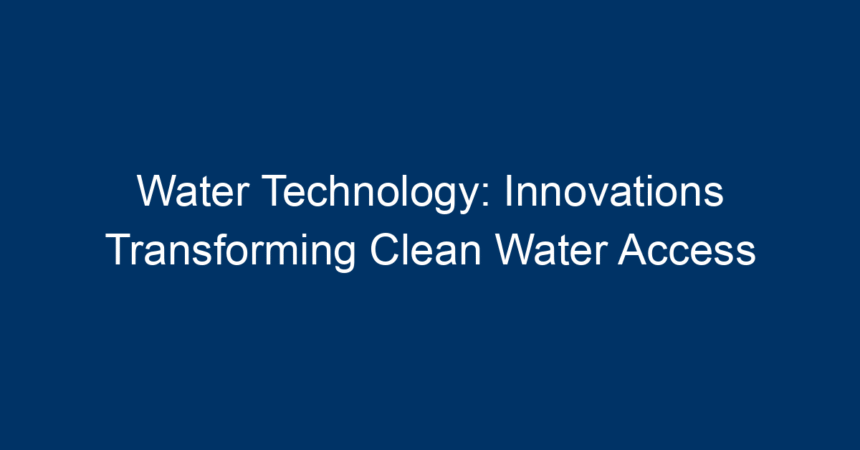In an age where access to clean water is not just a luxury but a necessity, water technology is rapidly evolving to meet the growing global demands. By harnessing innovations in science and engineering, we are unlocking new pathways to ensure that every individual can enjoy safe, clean drinking water. From advanced filtration methods to smart irrigation systems, the landscape of water technology is reshaping how we view and interact with this vital resource.
The Global Water Crisis: An Urgent Challenge
Before diving into the innovations in water technology, it’s essential to understand the scope of the challenge we face. According to the United Nations, approximately 2 billion people worldwide lack access to safe drinking water. This statistic is alarming and portrays a clear need for creative solutions to address the crisis.
Understanding Water Scarcity
Water scarcity is a multifaceted issue that stems from various factors, including population growth, climate change, and pollution. Many regions are witnessing increased competition for water resources, resulting in heightened tensions and conflicts. This scenario emphasizes the urgent need for breakthroughs in water technology to secure our future.
Innovative Water Treatment Technologies
The process of making water safe for consumption has been revolutionized through several innovative treatment methods. Let’s explore some groundbreaking technologies that are changing the game.
1. Advanced Filtration Systems
One of the leading advancements in water technology is the development of highly effective filtration systems. Traditional methods like reverse osmosis are being enhanced with new materials that increase efficiency and reduce energy consumption. Nanotechnology is particularly promising, as it enables the creation of membranes that efficiently remove impurities while allowing clean water to flow through.
2. UV Water Purification
Ultraviolet (UV) water purification is gaining traction as an environmentally friendly alternative to chemical disinfectants. This method employs UV light to eliminate harmful bacteria, viruses, and other pathogens without altering the water’s chemical composition. Portable UV purifiers are especially popular for rural and under-resourced communities, offering a simple yet effective solution for clean water access.
3. Solar Water Desalination
With the increasing salinity of freshwater sources, solar water desalination is emerging as a sustainable solution. Utilizing solar energy to transform seawater into potable water reduces dependence on fossil fuels and minimizes environmental impact. Innovations in solar still designs and energy-efficient processes are making this technology more viable for coastal communities suffering from freshwater shortages.
Smart Water Management Systems
Water technology is not limited to water treatment. The entire process of managing water resources is being transformed through smart technology. These systems aim to maximize efficiency and minimize waste.
4. Smart Irrigation Systems
Agriculture accounts for approximately 70% of global freshwater use, making efficient irrigation crucial. Smart irrigation systems utilize sensors, weather forecasts, and AI algorithms to optimize water usage. By delivering the right amount of water at the right time, these systems help conserve water while enhancing crop yields, thereby promoting sustainable farming practices.
5. Leak Detection Technology
Water loss through leaks is a significant issue facing urban areas, leading to wastage of precious resources. Innovative leak detection technologies use advanced sensors and real-time monitoring systems to identify leaks in pipelines before they become problematic. By promptly addressing leaks, municipalities can save millions in water and operational costs.
6. Data Analytics for Water Quality
Data analytics is playing an increasingly important role in monitoring water quality. Sensors deployed in water bodies collect data on various parameters such as pH, turbidity, and contaminants. Advanced analytics then processes this data, alerting authorities to potential risks and ensuring timely interventions. This proactive approach is essential for maintaining safe drinking water standards.
Sustainable Practices in Water Technology
As we seek innovative solutions through water technology, sustainability remains a core principle. Here are some practices that align with this vision:
7. Rainwater Harvesting
Rainwater harvesting is an ancient technique that’s gaining newfound attention. Modern water technology is refining these systems by integrating them with smart sensors to optimize collection and storage. This decentralized approach allows households and communities to supplement their water supply, reducing their reliance on municipal sources.
8. Water Recycling Systems
Water recycling, or reclaimed water usage, is a sustainable practice crucial for urban water management. Advanced treatment technologies enable wastewater to be purified and reused for irrigation, industrial processes, and even potable applications. Innovations in membrane bioreactors and integrated treatment systems are boosting the effectiveness of water recycling initiatives.
Case Studies of Successful Implementations
Real-world examples often provide the best insights into how water technology can transform communities. Below are notable instances where innovative technologies have made a substantial impact.
9. Windhoek, Namibia: The World’s First City to Use Treated Wastewater for Drinking
Windhoek has pioneered a successful water reclamation project, treating wastewater for direct potable reuse. By combining advanced filtration with rigorous treatment processes, the city has effectively created a sustainable source of drinking water, showcasing a model that can be replicated in areas facing severe water scarcity.
10. Singapore’s NEWater Project
Singapore’s NEWater project is a beacon of innovation in water technology. By treating and recycling wastewater, Singapore has reduced its reliance on imported water to around 30%. This project demonstrates how advanced technologies can transform wastewater into a valuable resource, benefiting both the environment and public health.
The Role of Policy and Public Awareness
Innovations in water technology are just one piece of the puzzle. Effective policies and public awareness play a crucial role in facilitating these advancements.
11. Government Initiatives
Governments around the world play a pivotal role in promoting water technology through funding, research, and regulations. Initiatives that encourage public-private partnerships can foster innovation, leading to the faster deployment of new solutions.
12. Educating Communities
Raising awareness about the importance of water conservation and technology is essential. Educational campaigns can empower communities to adopt sustainable practices, promoting a culture of responsible water use. This includes understanding the benefits of new technologies and the necessity of safeguarding this vital resource.
Conclusion: The Path Ahead
As the challenges surrounding clean water access continue to mount, the role of water technology is undeniably crucial. Innovations in filtration, smart management, and sustainable practices are paving the way for a future where everyone can enjoy clean water.
Actionable Insights
- Stay Informed: Keep up with the latest developments in water technology to understand how innovations can impact your community.
- Advocate for Sustainable Practices: Encourage local governments to invest in advanced water management and treatment technologies.
- Implement Water-Saving Techniques: Similar to smart irrigation, find ways to reduce water usage in your daily life—every drop counts.
- Promote Awareness: Engage in community discussions about the importance of clean water and innovative technologies.
By embracing the potential of water technology, we can collectively work towards a healthier future, ensuring that clean water is a right enjoyed by all.




